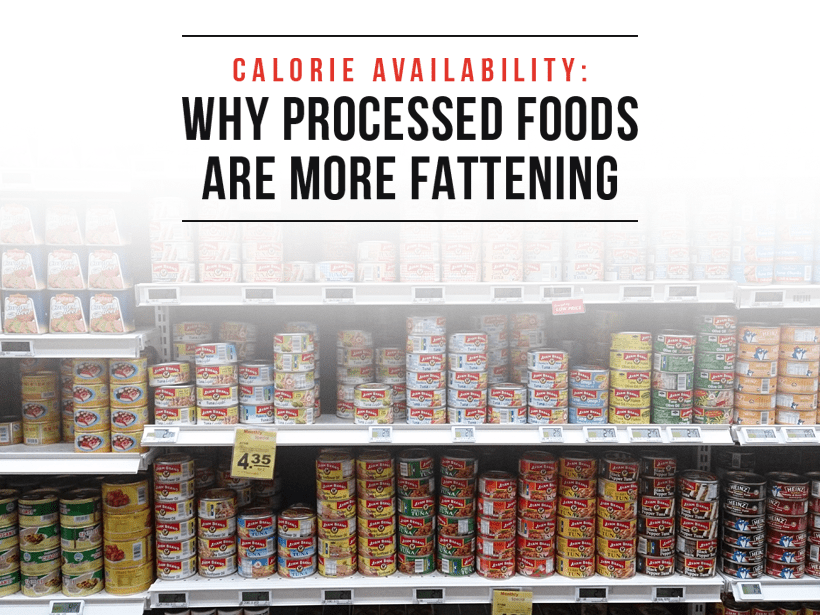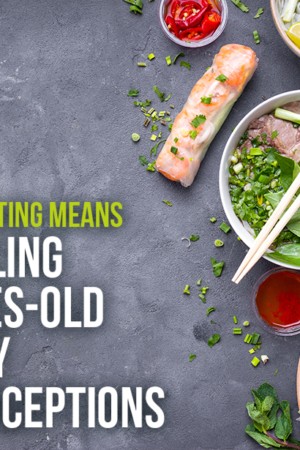When it comes time to slim down or lose some belly fat, many busy men and women turn to frozen low-calorie meals as a seemingly quick and convenient option to keep them on track and away from fast food during the workweek. But are these self-proclaimed “diet foods” actually good for your waistline? Dr. Giles Yeo, a principal research assistant with the Institute of Metabolic Science with Cambridge University, says no! In a recent interview with SBS Australia, Dr. Yeo explained the idea of “calorie availability” and why your frozen dinner may be hiding more calories than the box says.1
How digestion burns calories
Contrary to popular belief, digestion is not a passive process—from mechanically digesting your food by chewing to chemically breaking down a meal with a churning stomach, the digestive process requires calories. The number of calories that you see printed on a frozen meal is what scientists refer to as a “net calorie count;” it’s taking into account how many calories you will consume once the digestive process has been completed. The actual caloric count of the meal is assumed to be a bit higher because the net amount printed on the label has had the calories used for digestion subtracted. However, Dr. Yeo explained that the numbers found on processed frozen meals may be underestimated, as the processing required to keep these meals edible often breaks many of the chemical bonds that would typically be broken during digestion, thus lowering the number of calories our bodies use to digest the food when compared to fresh meals.
“If a lot of the [digestive] work has been done for you by the processing [of a frozen meal], you’re going to get more calories out of the 400 calories of a ready meal than the 400 calories [of a meal] you cooked yourself at home.”
This is called “calorie availability”; foods with low calorie availability (like fresh fruits, vegetables, and protein) require more calories to digest. On the opposite end of the spectrum, foods with high calorie availability (like processed frozen foods) already have many of the bonds broken—these meals require less energy to process, leaving more calories to be converted into fat.
Processed foods: stuffed with sugar?
In addition to underestimating calorie count, frozen meals may also be packed with ingredients that are damaging to the waistline. The biggest perpetrator? Excess sugar. Because processed foods usually have additives that allow them to maintain their edibility, excessive amounts of sugar and salt are typically added to the meal to make them more appetizing.
“When [a meal is] highly processed, you remove flavor, which means you have to add more fat and more sugar and more salt in order to make it tastier,” says Dr. Yeo.
How to limit your consumption of processed foods
If you’re looking to shed some pounds, relying on processed frozen meals may be doing more harm than good. Filling your diet with quality sources of protein and vegetables that are low in carbohydrates can help you feel fuller longer, removing the temptation to head to the frozen food aisle. Planning your shopping list and trying meal prep are also two ways that busy men and women can eat healthier—even on the go!
NUTRITIONAL DISCLAIMER
The content on this website should not be taken as medical advice and you should ALWAYS consult with your doctor before starting any diet or exercise program. We provide nutritional data for our recipes as a courtesy to our readers. We use Total Keto Diet app software to calculate the nutrition and we remove fiber and sugar alcohols, like erythritol, from the total carbohydrate count to get to the net carb count, as they do not affect your blood glucose levels. You should independently calculate nutritional information on your own and not rely on our data. The website or content herein is not intended to cure, prevent, diagnose or treat any disease. This website shall not be liable for adverse reactions or any other outcome resulting from the use of recipes or recommendations on the Website or actions you take as a result. Any action you take is strictly at your own risk.
- This Grocery Store Team Lost Over 200 Pounds Using Keto - December 19, 2018
- Treating Diabetes with Weight Loss - December 12, 2018
- Ancient Nutrition Connects With Natural Partners - December 5, 2018




